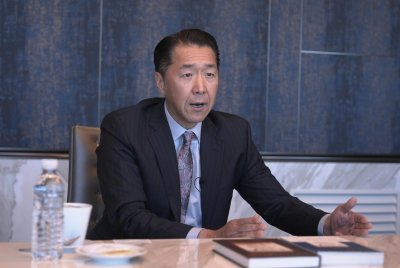“Korean Dream” author urges Korean citizens to reclaim a vision for a free and unified Korea amid heightened regional stakes

Hyun Jin Preston Moon, chairman of the Global Peace Foundation and author of The Korean Dream, speaks in Seoul on Wednesday, Feb. 25, 2026, saying Korea stands at a “historic turning point” and that the choices Koreans make now will have profound consequences for future generations. He urged a citizen-led effort to reshape public understanding of unification as North Korea hardens its stance toward the South. Photo by Ronald Park / Global Peace Foundation
March 2 (UPI) — In a recent interview with journalists from several Korean media outlets, Dr. Hyun Jin Preston Moon, Chairman of the Global Peace Foundation and author of The Korean Dream, warned that Korea stands at a pivotal crossroads where the decisions made and actions taken will determine the fate of the Korean Peninsula and the future direction of the Korean people for generations to come. With Washington focused on numerous global crises and lacking a clear policy towards North Korea, he said, it is precisely now that the Korean people must assert themselves in support of a free and unified homeland.
The interview took place amid deepening inter-Korean tensions. At the end of 2023, North Korean leader Kim Jong Un formally abandoned the goal of unification which had existed since the formation of North Korea under his grandfather Kim Il Sung’s rule. He designated the two Koreas as “hostile states” and ordered revision of the DPRK constitution to remove reunification as a national objective.
Moon defined North Korea’s formal adoption of the “two hostile states” doctrine as a structural turning point, one that exposes the fragility of the Kim regime. He said the situation demands strategic clarity rather than reliance on past engagement models, and requires that a compelling alternative vision to be placed on the table before this window of opportunity closes.
Conciliatory approaches, he said, carry meaning only when both sides share the goal of unification. When one side formally abandons that goal and redefines the other as an enemy, the entire strategic framework must be fundamentally reconsidered. Clinging to outdated models, he warned, is not diplomacy – it is self-delusion.
At the core of the alternative he is presenting is the Korean Dream – a comprehensive national vision rooted in Korea’s civilizational heritage spanning five millennia and grounded in democratic governance, economic opportunity, and fundamental human rights and freedoms for all its citizens. Rather than reacting to Pyongyang’s provocations, Moon argues, South Korea must define the peninsula’s future on its own terms. He noted that the previous Korean administration had already accepted the Korean Dream framework in principle; during the 2023 Camp David Summit, the U.S. and Japan agreed to support South Korea in its pursuit of a free and unified Korea. Moon also called for a non-governmental advisory committee to replace the current Ministry of Unification to allow for institutional continuity in how South Korea’s administration relates to North Korea, noting that the ideological reversals with each consecutive administration have long undermined inter-Korean policy.
Central to the Korean Dream vision is Hongik Ingan – the founding Korean ethos, roughly translated as “to broadly benefit humanity.” Moon describes this as the spiritual and historical bedrock of Korean identity. He emphasized that it is not an abstract ideal but a living principle that has been passed from generation to generation as part of the Korean people’s heritage and infuses unification with a high-minded purpose. Koreans must rediscover this founding spirit, he said, and see themselves not as passive pawns of geopolitical forces but as active agents with a civilizational mission.
On economic concerns, Moon was direct. Unification is not a burden but an opportunity of historic scale, he said, particularly for Korea’s younger generation. A unified Korea would integrate the more than 25 million North Korean residents into a new domestic market, rebalance its export-dependent economy, and spur large-scale infrastructure development, industrial restructuring, and expanded regional influence.
Moon drew parallels of the potential economic transformation that unification could unleash to China’s wealthy coastal cities that burgeoned with its historic shift from a centrally planned to a market economy. For the Korean Peninsula, he continued, such changes could fuel what he called a second Miracle on the Han River. The generation that seizes this moment, he said, will not merely inherit a problem but will open a new chapter of flourishing for Korean civilization.
The decisive factor shaping the Peninsula’s future, Moon argued, is neither military posture nor diplomatic maneuvering – it is public consciousness. If South Korean youth come to see unification not as a financial burden inherited from their predecessors but as a civilizational mission rooted in Hongik Ingan, that shift in public imagination will become the most powerful engine for change on the Korean Peninsula.
He pointed to North Korea’s growing internal vulnerabilities as evidence that the window for shaping the arc of history is narrowing. Rising defection rates – including among senior officials- and the regime’s deepening economic fragility suggest that the structures sustaining Kim Jong Un’s control are under mounting pressure. Moon said Kim is likely reassessing his long-term strategic options as he observes the dramatic upheaval unfolding in Iran.
“The regime’s current two-state posture is not necessarily permanent,” Moon said. “What matters is whether the right alternative is on the table.” He urged the South Korean administration to adopt the Korean Dream vision and offered to support and advise the U.S. administration as it further develops its strategy and approach to the Koreas.
